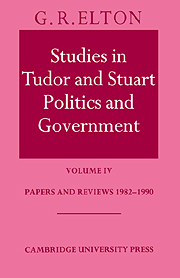Book contents
- Frontmatter
- Contents
- Preface
- Acknowledgments
- Abbreviations
- I POLITICS AND THE REFORMATION
- 49 The State: Government and Politics under Elizabeth and James
- 50 Lex Terrae Victrix: the Triumph of Parliamentary Law in the Sixteenth Century
- 51 Human Rights and the Liberties of Englishmen
- 52 King Henry VII
- 53 Wales in Parliament, 1542–1581
- 54 Piscatorial Politics in the Early Parliaments of Elizabeth I
- 55 English National Self-consciousness and the Parliament in the Sixteenth Century
- 56 Thomas More and Thomas Cromwell
- 57 Lancelot Andrewes
- 58 Persecution and Toleration in the English Reformation
- 59 Auseinandersetzung und Zusammenarbeit zwischen Renaissance und Reformation in England
- 60 Humanism in England
- 61 Luther in England
- 62 Die europäische Reformation: Mit oder ohne Luther?
- II ON HISTORIANS
- Index of Authors Cited
- General Index
49 - The State: Government and Politics under Elizabeth and James
Published online by Cambridge University Press: 03 February 2010
- Frontmatter
- Contents
- Preface
- Acknowledgments
- Abbreviations
- I POLITICS AND THE REFORMATION
- 49 The State: Government and Politics under Elizabeth and James
- 50 Lex Terrae Victrix: the Triumph of Parliamentary Law in the Sixteenth Century
- 51 Human Rights and the Liberties of Englishmen
- 52 King Henry VII
- 53 Wales in Parliament, 1542–1581
- 54 Piscatorial Politics in the Early Parliaments of Elizabeth I
- 55 English National Self-consciousness and the Parliament in the Sixteenth Century
- 56 Thomas More and Thomas Cromwell
- 57 Lancelot Andrewes
- 58 Persecution and Toleration in the English Reformation
- 59 Auseinandersetzung und Zusammenarbeit zwischen Renaissance und Reformation in England
- 60 Humanism in England
- 61 Luther in England
- 62 Die europäische Reformation: Mit oder ohne Luther?
- II ON HISTORIANS
- Index of Authors Cited
- General Index
Summary
CENTRAL GOVERNMENT
The England of Shakespeare's day was a monarchy, but a monarchy of a special kind. Though the king or queen ruled without question and stood isolated at the apex of the social and political pyramid, that rule had to be exercised within quite well-defined limitations: it was in no sense despotic, though it could be autocratic. The most formal conditions of restraint existed in the law of the land, called the common law, and its accepted conventions. Though the monarch possessed special rights not available to his subjects, these so-called prerogatives themselves received definition in terms of the law.
Royal prerogatives – rights enjoyed by that person whose duties were special and could not be discharged without such rights – were usually divided into two kinds, ordinary and absolute, which refer to the relationship between royal rights and the law. Ordinary (meaning ordained) signified ‘defined in the law of the realm’ absolute (free of the law) meant ‘not so defined’, the implication being that they could not be defined because they touched upon unpredictable needs of the state that the ruler must be able to meet. Ordinary prerogatives included the fiscal rights of the crown, the power to appoint to office, the right to dispense justice and the regulation of trade. Absolute prerogatives included the making of peace and war, but also (more ominously) the taking of necessary action against alleged enemies of the commonwealth, as, for instance, imprisonment and examination under torture. The absolute prerogative unquestionably had autocratic and even tyrannous possibilities; it needed to be used with tact and without arousing dangerous dissatisfaction, the more so because this monarchy disposed of only a minimal establishment of armed force.
- Type
- Chapter
- Information
- Studies in Tudor and Stuart Politics and Government , pp. 3 - 36Publisher: Cambridge University PressPrint publication year: 1992



